Did you know that the global electrical equipment market is projected to reach a staggering $46.1 billion by 2026? As one of the industry giants, Schneider Electric faces fierce competition from several formidable players. In this article, we’ll dive deep into the world of electrical equipment and automation to explore Schneider Electric’s top competitors. From innovative startups to established multinational corporations, we’ll uncover the strengths, strategies, and market positions that make these companies stand out. Whether you’re an industry professional, investor, or simply curious about the electrical equipment landscape, this comprehensive guide will give you the insider’s perspective you’ve been looking for!
The Electrical Equipment and Automation Landscape
Before we delve into Schneider Electric’s competitors, let’s set the stage by examining the current state of the electrical equipment and automation industry. The market is experiencing robust growth, driven by several key factors:
- Increasing demand for energy-efficient solutions
- Rapid industrialization in developing countries
- Growing adoption of smart home and building technologies
- Rising focus on renewable energy sources
- Advancements in IoT and AI technologies
Schneider Electric, founded in 1836, has long been a major player in this landscape. The company has evolved from its roots in steel and armaments to become a global specialist in energy management and automation. With operations in over 100 countries, Schneider Electric has established itself as a leader in providing solutions for homes, buildings, data centers, infrastructure, and industries.
Understanding the competitive landscape is crucial for industry professionals, investors, and customers alike. It provides insights into technological trends, market dynamics, and potential opportunities for growth and innovation. Now, let’s explore the top competitors that are challenging Schneider Electric’s market position.
Top Competitors of Schneider Electric
1. ABB Ltd
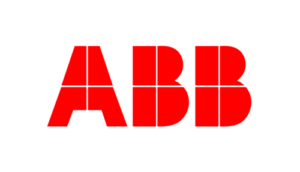
Website – https://global.abb/group/en
ABB Ltd, a result of the 1988 merger between Sweden’s ASEA and Switzerland’s Brown Boveri, stands as one of Schneider Electric’s most formidable competitors. With a presence in over 100 countries, ABB has established itself as a global leader in electrification, robotics, and industrial automation.
Key product offerings:
- Power grids
- Electrification products
- Industrial automation
- Robotics and motion
ABB’s strengths lie in its cutting-edge robotics and automation technologies. The company has been at the forefront of developing collaborative robots, or “cobots,” which are designed to work alongside humans in manufacturing environments. This focus on advanced robotics gives ABB a competitive edge in Industry 4.0 applications.
Recent innovations from ABB include:
- YuMi, the world’s first truly collaborative dual-arm robot
- ABB Ability™, a unified, cross-industry digital platform
- Ultra-fast electric vehicle chargers
Strategic initiatives, such as the divestment of its Power Grids business to Hitachi, have allowed ABB to focus more intensely on digital industries. This move positions the company to compete more directly with Schneider Electric in the industrial automation and smart building sectors.
2. Siemens AG
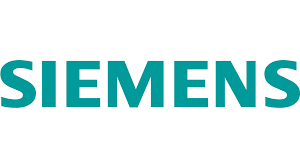
Website – https://www.siemens.com/global/en.html
Siemens AG, a German conglomerate, is another major competitor to Schneider Electric. With a history dating back to 1847, Siemens has built a reputation for engineering excellence and innovation across multiple industries.
Siemens’ diverse portfolio includes:
- Digital Industries
- Smart Infrastructure
- Mobility
- Siemens Healthineers (separately listed)
- Siemens Energy (majority stake)
In terms of market share, Siemens often goes head-to-head with Schneider Electric, particularly in the areas of industrial automation and smart building technologies. Siemens has been a pioneer in the concept of “Digital Twin” technology, which allows for virtual representation and testing of physical assets.
The company’s focus on digital transformation and Industry 4.0 solutions sets it apart. Siemens’ MindSphere, an open IoT operating system, competes directly with Schneider Electric’s EcoStruxure platform. Both systems aim to connect smart devices and analyze data to improve efficiency and productivity.
Notable acquisitions and partnerships include:
- Acquisition of Mendix, a low-code application development platform
- Partnership with SAP for end-to-end software solutions for product lifecycle, supply chain, and asset management
3. Eaton Corporation

Website – https://www.eaton.com/
Eaton Corporation, an Irish-domiciled multinational with American roots, specializes in power management solutions. The company’s expertise in electrical systems for power distribution and control makes it a direct competitor to Schneider Electric in several key markets.
Eaton’s strengths include:
- Power distribution and circuit protection
- Power quality and energy storage solutions
- Lighting and wiring devices
- Hydraulics for industrial and mobile equipment
What sets Eaton apart from Schneider Electric is its strong presence in the aerospace industry, providing hydraulic and fuel systems for aircraft. This diversification gives Eaton a unique position in the market.
In recent years, Eaton has been expanding aggressively into emerging markets and green technologies. The company has launched several innovative products, including:
- Energy-aware UPS systems with lithium-ion batteries
- Microgrid energy systems for improved power reliability and sustainability
- xStorage, a home energy storage solution competing with offerings from Schneider Electric and others
Eaton’s sustainability initiatives, such as its commitment to carbon neutrality by 2030, align with global trends and position the company as a forward-thinking competitor in the electrical equipment space.
4. Emerson Electric Co.

Website – https://www.emerson.com/
Emerson Electric Co., founded in 1890 in St. Louis, Missouri, has grown into a global technology and engineering powerhouse. The company’s strengths in process and industrial automation make it a significant competitor to Schneider Electric, particularly in the manufacturing and process industries.
Emerson’s key offerings include:
- Automation solutions for process and hybrid industries
- Commercial and residential solutions (HVAC, refrigeration, tools)
In comparison to Schneider Electric, Emerson has a particularly strong foothold in the oil and gas, chemical, and power generation industries. Its DeltaV distributed control system is widely used in process industries and competes directly with Schneider’s PlantStruxure PES.
Emerson has been at the forefront of developing Industrial Internet of Things (IIoT) solutions. The company’s Plantweb digital ecosystem, which includes pervasive sensing technologies, edge controls, and analytics software, is designed to improve operational performance and is a direct competitor to Schneider’s EcoStruxure platform.
Strategic partnerships have been key to Emerson’s competitive strategy. Notable collaborations include:
- Partnership with AspenTech to deliver asset optimization software
- Collaboration with Microsoft to leverage cloud computing for Industrial IoT applications
5. Honeywell International Inc.

Website – https://www.honeywell.com/us/en
Honeywell International Inc., a multinational conglomerate, competes with Schneider Electric across several domains, particularly in building technologies and process automation. With a history dating back to 1906, Honeywell has established itself as a leader in a diverse range of industries.
Key areas where Honeywell competes with Schneider Electric include:
- Building Technologies (HVAC controls, security systems)
- Process Solutions (automation and control systems)
- Safety and Productivity Solutions
Honeywell’s competitive edge in smart building solutions is particularly noteworthy. The company’s Forge platform for connected buildings offers advanced analytics and AI-driven insights, competing directly with Schneider’s EcoStruxure Building platform.
In energy management, Honeywell offers solutions that rival Schneider Electric’s offerings. For instance, Honeywell’s Energy Management Solutions provide similar functionality to Schneider’s Power Monitoring Expert software, helping organizations optimize energy consumption and reduce costs.
Recent innovations from Honeywell that challenge Schneider Electric include:
- Honeywell Forge Cybersecurity Suite, enhancing the security of industrial control systems
- Honeywell Forge Energy Optimization, an autonomous building solution that continuously optimizes energy consumption
These developments showcase Honeywell’s focus on cybersecurity and connected technologies, areas where Schneider Electric is also investing heavily.
6. Rockwell Automation, Inc.
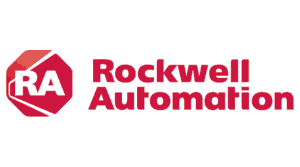
Website – https://www.rockwellautomation.com/
Rockwell Automation, headquartered in Milwaukee, Wisconsin, is a pure-play industrial automation company and a significant competitor to Schneider Electric in this space. Founded in 1903, Rockwell has built a strong reputation for its control systems, industrial software, and IoT solutions.
Key strengths of Rockwell Automation include:
- Programmable Logic Controllers (PLCs) and Human-Machine Interfaces (HMIs)
- Manufacturing Execution Systems (MES)
- Industrial IoT and analytics platforms
In comparison to Schneider Electric, Rockwell has a particularly strong presence in discrete manufacturing industries, such as automotive and consumer goods. The company’s FactoryTalk suite of industrial software competes directly with Schneider’s EcoStruxure Plant solutions.
Rockwell’s focus on developing a comprehensive ecosystem for industrial automation sets it apart. The company has been strategic in forming alliances and partnerships to enhance its offerings:
- Strategic partnership with PTC for Industrial IoT and augmented reality solutions
- Collaboration with Microsoft for cloud-based manufacturing solutions
These alliances allow Rockwell to offer end-to-end solutions that rival the integrated approach of Schneider Electric’s EcoStruxure platform.
7. Mitsubishi Electric Corporation
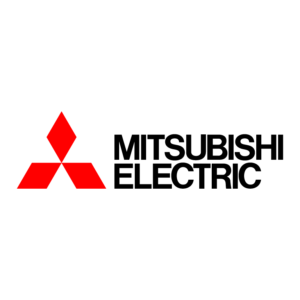
Website – https://www.mitsubishielectric.com/
Mitsubishi Electric, a core company of the Mitsubishi Group, is a major player in the electrical and electronic equipment industry. With a strong presence in factory automation and electrical systems, Mitsubishi Electric poses significant competition to Schneider Electric, particularly in Asian markets.
Key areas where Mitsubishi Electric competes include:
- Factory Automation systems
- Power systems and electrical equipment
- Building systems (elevators, air conditioning)
Mitsubishi’s strengths in energy-efficient solutions rival those of Schneider Electric. The company’s e-F@ctory concept, which aims to optimize manufacturing through IoT and edge computing technologies, competes with Schneider’s EcoStruxure Plant solutions.
In recent years, Mitsubishi Electric has made significant advancements in AI and IoT integration for industrial applications. The company’s MAISART (Mitsubishi Electric’s AI creates the State-of-the-ART in technology) applies AI technology to improve productivity and quality in manufacturing.
Mitsubishi has also been at the forefront of smart grid technologies, developing solutions for power distribution automation and grid stabilization. These offerings compete directly with Schneider Electric’s grid automation and control systems.
8. Legrand SA
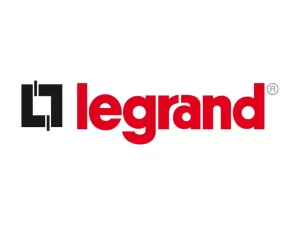
Website – https://www.legrand.us/
Legrand SA, a French industrial group, is a formidable competitor to Schneider Electric, particularly in the areas of electrical and digital building infrastructures. Founded in 1860, Legrand has grown to become a global specialist in electrical and digital building infrastructures.
Legrand’s key product categories include:
- Wiring devices and lighting controls
- Energy distribution
- Home systems
- Cable management
In comparison to Schneider Electric, Legrand has a particularly strong focus on residential and small commercial buildings. The company’s Eliot program, aimed at developing connected devices, competes with Schneider’s residential smart home offerings.
Legrand’s strengths in energy efficiency and smart home solutions are notable. Products like the company’s Smart Electrical Panel rival Schneider’s Wiser Energy system, offering homeowners detailed insights into their energy consumption and the ability to control circuits remotely.
Recent strategic moves by Legrand include:
- Acquisition of Netatmo, a smart home device manufacturer
- Expansion into the data center power and control market with the acquisition of Server Technology
These moves position Legrand to compete more directly with Schneider Electric across a broader range of market segments, from residential to data center infrastructure.
9. Johnson Controls International plc

Website – https://www.johnsoncontrols.com/
Johnson Controls International plc, with roots tracing back to 1885, is a major competitor to Schneider Electric in the building technologies and solutions space. The company’s focus on smart, healthy, and sustainable buildings aligns closely with many of Schneider’s key markets.
Key areas of competition include:
- Building management systems
- HVAC equipment and controls
- Fire detection and security systems
- Energy storage solutions
Johnson Controls’ strengths in HVAC and building management systems are particularly noteworthy. The company’s OpenBlue digital platform, which offers AI-powered service solutions for smart, connected, and sustainable buildings, competes directly with Schneider’s EcoStruxure Building platform.
In comparison to Schneider Electric, Johnson Controls has a stronger heritage in mechanical systems for buildings, which complements its more recent focus on digital and IoT technologies. This combination allows Johnson Controls to offer comprehensive solutions for building performance optimization.
Recent innovations from Johnson Controls include:
- OpenBlue Enterprise Manager, which uses AI to optimize building performance
- OpenBlue Indoor Air Quality as a Service, addressing growing concerns about indoor air quality in the wake of the COVID-19 pandemic
These developments showcase Johnson Controls’ focus on sustainability and energy efficiency, areas where Schneider Electric is also heavily invested.
10. General Electric (GE)
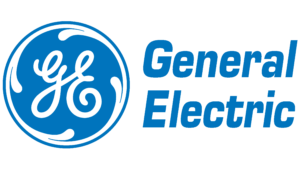
Website – https://www.ge.com/
General Electric (GE), an American multinational founded in 1892, competes with Schneider Electric primarily in the power generation and grid solutions sectors. Despite recent restructuring, GE remains a significant player in the electrical equipment and energy management space.
GE’s key areas of competition with Schneider Electric include:
- Power generation equipment
- Grid solutions
- Renewable energy technologies
GE’s strengths in power generation, particularly in gas and wind turbines, complement its grid solutions offerings. The company’s grid automation and control systems compete directly with Schneider Electric’s offerings in this space.
In recent years, GE has focused intensely on digital transformation in the energy sector. The company’s Digital Energy portfolio, which includes software for grid optimization and renewable energy integration, competes with Schneider’s EcoStruxure Grid solutions.
GE has undergone significant restructuring in recent years, including:
- Spin-off of its healthcare division
- Plans to separate its power, renewable energy, and digital businesses into a standalone company
These strategic shifts may allow GE to focus more intensely on its core energy businesses, potentially intensifying competition with Schneider Electric in these areas.
Emerging Competitors and Market Disruptors
While established players dominate much of the electrical equipment and automation market, several emerging competitors and startups are introducing disruptive technologies that could reshape the competitive landscape:
- AutoGrid: Specializes in AI-powered flexible energy management solutions
- C3.ai: Offers AI and IoT applications for utilities and energy management
- Stem, Inc.: Provides intelligent energy storage solutions
- Enlighted (a Siemens company): Offers IoT solutions for smart buildings
Key technological trends shaping the competitive landscape include:
- Edge computing for real-time data processing
- Artificial Intelligence and Machine Learning for predictive maintenance and optimization
- Blockchain for secure energy trading and grid management
- 5G connectivity for enhanced IoT capabilities
These emerging players and technologies represent both potential threats and opportunities for established companies like Schneider Electric. Collaboration and partnerships with innovative startups could be key to maintaining a competitive edge in this rapidly evolving industry.
Comparative Analysis: Schneider Electric vs. Competitors
When comparing Schneider Electric to its competitors, several key factors come into play:
Market Share:
- Schneider Electric holds a strong position in the global electrical equipment market, particularly in low and medium voltage equipment.
- ABB and Siemens are close competitors in terms of overall market share, with each company having strengths in different segments.
- In specific markets like building automation, Johnson Controls and Honeywell pose significant competition.
Strengths of Schneider Electric:
- Comprehensive energy management and automation solutions
- Strong focus on sustainability and energy efficiency
- Well-established EcoStruxure platform for IoT-enabled solutions
- Global presence with strong brand recognition
Weaknesses compared to competitors:
- Less diversified portfolio compared to conglomerates like Siemens or GE
- Stronger in commercial and industrial sectors than in residential markets (where Legrand excels)
- Less presence in heavy industrial processes compared to Emerson or Rockwell Automation
Unique Selling Propositions:
- Integrated approach to energy management and automation
- Strong focus on edge control and analytics
- Commitment to sustainability and carbon neutrality
Future Outlook:
The electrical equipment and automation industry is poised for continued growth, driven by increasing demand for energy-efficient solutions, smart technologies, and renewable energy integration. Schneider Electric and its competitors are well-positioned to benefit from these trends, but success will depend on their ability to innovate, adapt to changing market demands, and effectively leverage emerging technologies.
For Schneider Electric, key areas for future growth and competition include:
- Expansion of its digital services and software offerings
- Further development of solutions for the renewable energy sector
- Strengthening its position in emerging markets
- Continued focus on sustainability and energy efficiency solutions
As the industry continues to evolve, Schneider Electric and its competitors will need to stay agile, embracing new technologies and business models to maintain their market positions. The ability to provide integrated, end-to-end solutions that address the complex challenges of energy management and automation will be crucial for success.
Emerging Trends Shaping the Competitive Landscape
Several key trends are likely to influence the competitive dynamics in the electrical equipment and automation industry:
- Increased focus on cybersecurity: As industrial systems become more connected, robust cybersecurity solutions will be a key differentiator. Companies that can offer secure, resilient systems will have a competitive advantage.
- Shift towards renewable energy: The global push for clean energy is driving demand for smart grid technologies, energy storage solutions, and advanced power electronics. Competitors that can innovate in these areas will be well-positioned for growth.
- Adoption of AI and machine learning: Advanced analytics and AI-driven insights are becoming increasingly important in optimizing energy use and industrial processes. Companies that can effectively integrate these technologies into their offerings will stand out.
- Growth of edge computing: The need for real-time data processing in industrial and building applications is driving the adoption of edge computing solutions. Competitors that can offer robust edge capabilities alongside their core products will have an edge.
- Expansion of IoT and connected devices: The proliferation of IoT devices in industrial and building environments is creating new opportunities for data-driven services and solutions. Companies that can leverage this trend effectively will be able to create new revenue streams and strengthen customer relationships.
Strategies for Success in a Competitive Market
For Schneider Electric and its competitors to thrive in this dynamic landscape, several key strategies will be crucial:
- Invest in R&D and innovation: Continuous innovation in core technologies and emerging areas like AI, IoT, and edge computing will be essential to stay ahead of the curve.
- Foster strategic partnerships: Collaborations with technology companies, startups, and academic institutions can help accelerate innovation and expand capabilities.
- Focus on customer-centric solutions: Developing flexible, scalable solutions that address specific customer pain points will be key to differentiation in a crowded market.
- Embrace sustainability: As environmental concerns become increasingly important, companies that can offer energy-efficient, sustainable solutions will have a competitive advantage.
- Develop strong digital capabilities: Building robust software platforms and digital services will be crucial for delivering value in an increasingly connected world.
- Expand into new markets: Exploring opportunities in emerging markets and adjacent industries can help drive growth and reduce dependence on traditional revenue streams.
Conclusion: The Future of Competition in Electrical Equipment and Automation
As we’ve seen, the electrical equipment and automation industry is a hotbed of innovation and fierce competition. Schneider Electric faces formidable challengers across various segments, from industrial automation to smart building technologies. Each competitor brings unique strengths to the table, whether it’s ABB’s robotics expertise, Siemens’ digital transformation prowess, or Eaton’s power management solutions.
The industry is on the cusp of significant transformation, driven by trends such as the Internet of Things, artificial intelligence, and the global push for sustainability. These changes present both challenges and opportunities for established players like Schneider Electric and its competitors.
To succeed in this evolving landscape, companies will need to:
- Stay at the forefront of technological innovation
- Adapt quickly to changing market demands
- Build strong ecosystems through partnerships and collaborations
- Maintain a strong focus on cybersecurity and data privacy
- Embrace sustainability as a core business principle
For Schneider Electric, the key to success lies in leveraging its strengths in energy management and automation, addressing any weaknesses, and continuously adapting to the changing landscape. By keeping a close eye on these top competitors and emerging disruptors, the company can position itself to thrive in the years to come.
As for industry professionals and investors, staying informed about the competitive dynamics and emerging trends in this sector will be crucial for making sound decisions. The electrical equipment and automation industry is poised for exciting developments, and those who can navigate this complex landscape will be well-positioned to reap the rewards.
The future of electrical equipment and automation is bright – and the competition is just heating up! Whether you’re a seasoned industry professional, an investor looking for opportunities, or simply an enthusiast of cutting-edge technology, the evolving story of Schneider Electric and its competitors is one to watch closely. As we move towards a more connected, efficient, and sustainable future, these companies will play a pivotal role in shaping the world we live in. So, keep your finger on the pulse of this dynamic industry – the next big innovation could be just around the corner!
Also Read: A Deep Dive into the Marketing Strategies of Schneider Electric
To read more content like this, subscribe to our newsletter




